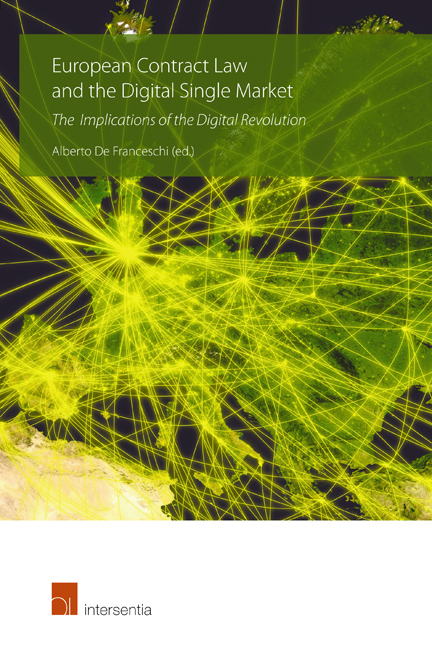Book contents
- Frontmatter
- Preface
- Contents
- List of Authors
- European Contract Law and the Digital Single Market: Current Issues and New Perspectives
- PART I THE IMPACT OF DIGITAL TECHNOLOGY ON PRIVATE LAW RELATIONSHIPS
- PART II DATA AS A TRADEABLE COMMODITY AND THE NEW INSTRUMENTS FOR THEIR PROTECTION
- PART III THE LEGISLATIVE INSTRUMENTS FOR A DIGITAL SINGLE MARKET
- PART IV NEW FEATURES OF STANDARD CONTRACTS IN THE DIGITAL MARKET
- PART V ONLINE PLATFORMS IN THE ‘SHARING ECONOMY’
- Crowdsourcing Consumer Confidence. How to Regulate Online Rating and Review Systems in the Collaborative Economy
Online Dispute Resolution Platform. Making European Contract Law More Effective
from PART V - ONLINE PLATFORMS IN THE ‘SHARING ECONOMY’
Published online by Cambridge University Press: 12 December 2017
- Frontmatter
- Preface
- Contents
- List of Authors
- European Contract Law and the Digital Single Market: Current Issues and New Perspectives
- PART I THE IMPACT OF DIGITAL TECHNOLOGY ON PRIVATE LAW RELATIONSHIPS
- PART II DATA AS A TRADEABLE COMMODITY AND THE NEW INSTRUMENTS FOR THEIR PROTECTION
- PART III THE LEGISLATIVE INSTRUMENTS FOR A DIGITAL SINGLE MARKET
- PART IV NEW FEATURES OF STANDARD CONTRACTS IN THE DIGITAL MARKET
- PART V ONLINE PLATFORMS IN THE ‘SHARING ECONOMY’
- Crowdsourcing Consumer Confidence. How to Regulate Online Rating and Review Systems in the Collaborative Economy
Summary
INTRODUCTION
Contract law and civil procedure law are two sides of the same coin. The absence of adequate means to apply the national and European substantive rules renders these rules irrelevant.
One of the main goals of the EU legislation related to contract law is ensuring the functioning of the internal market, which shall comprise an area without internal frontiers in which goods, persons, services and capital move freely (Article 26(2) Treaty on the Functioning of the European Union (TFEU)). In order to achieve this, the European Union shall adopt, inter alia, laws which ensure a high level of consumer protection (Articles 114 and 169 TFEU).
However, a high-level legal framework for consumer contracts may not be enough as the enforceability of a legal framework depends on procedures that allow the parties, especially the consumer, to settle disputes arising throughout the life of a contract.
At a European level, the existence of simple, efficient, fast and low-cost ways of resolving disputes is key to making European contract law – which is mainly consumer law – more effective. This idea inspired the legislative package adopted by the EU in 21 May 2013, which includes Directive 2013/11/EU of the European Parliament and of the Council on alternative dispute resolution for consumer disputes (Directive on Consumer ADR) and Regulation (EU) 524/2013 of the European Parliament and of the Council on online dispute resolution for consumer disputes (Regulation on Consumer ODR).
For example, if after calling an Uber, the car does not show up and the price of €3 is charged, would anyone even consider going to court?
The references to dispute resolution are nevertheless scarce in the supporting documents of the European digital single market strategy.
The European Commission, in a Communication of 6 May 2015, named ‘A Digital Single Market Strategy for Europe’, confirms our idea, stating that ‘just having a common set of rules is not enough’ and emphasising the ‘need for more rapid, agile and consistent enforcement of consumer rules for online and digital purchases to make them fully effective’. It is also added that ‘the Commission will establish in 2016 a EU-wide online dispute resolution platform’.
- Type
- Chapter
- Information
- European Contract Law and the Digital Single MarketThe Implications of the Digital Revolution, pp. 245 - 266Publisher: IntersentiaPrint publication year: 2016



